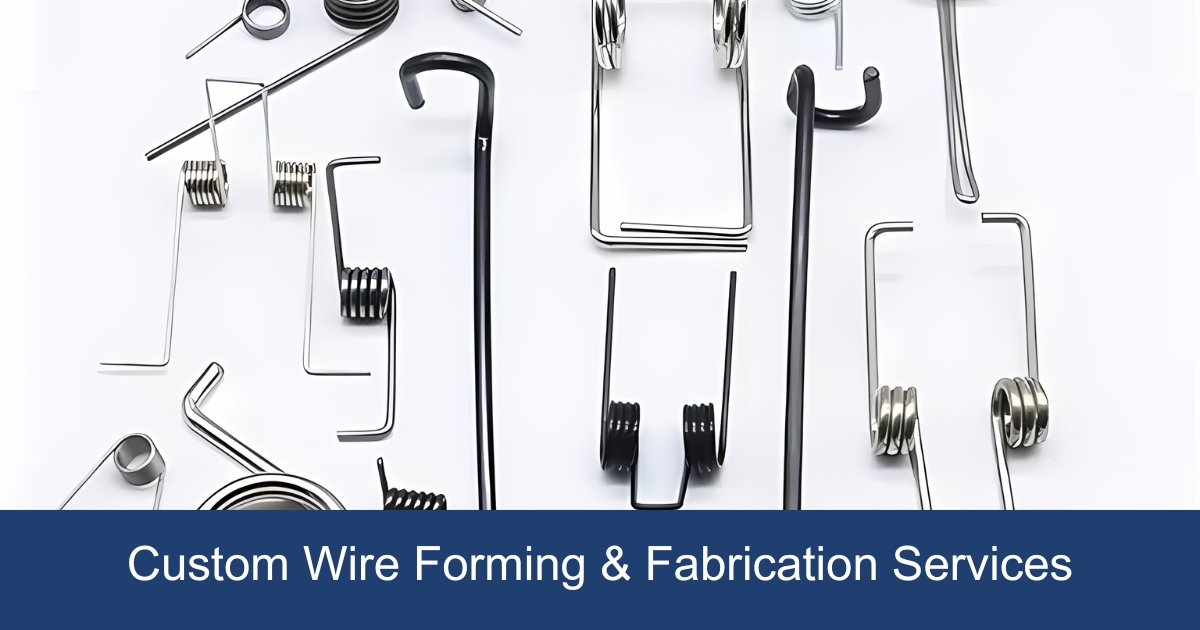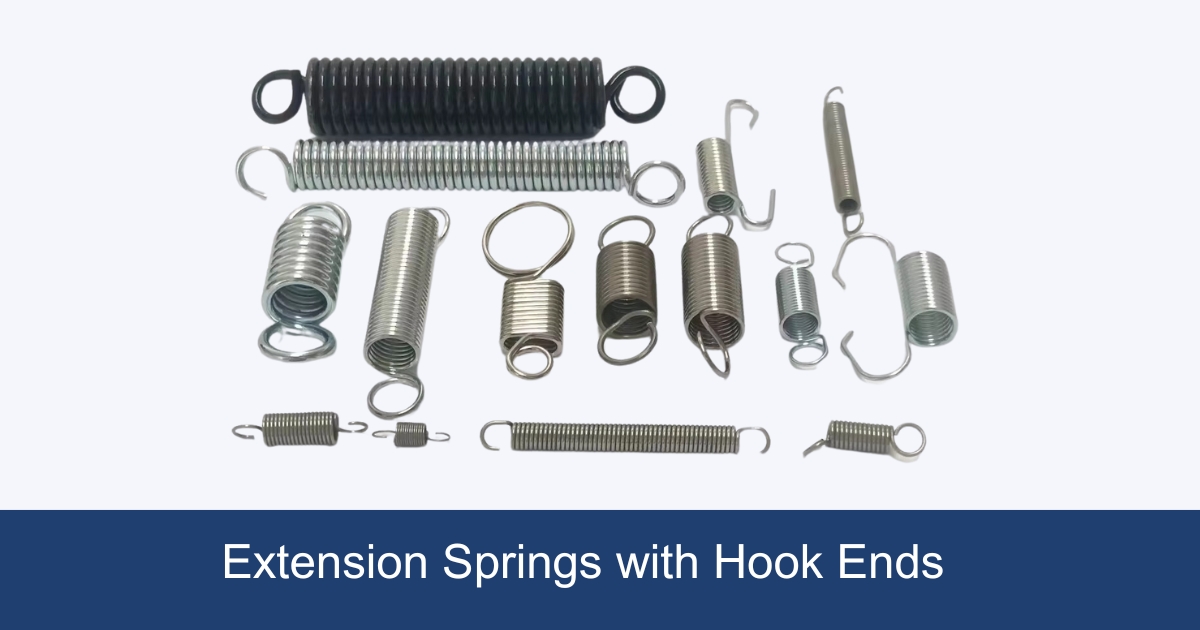This article will provide a comprehensive guide on how to select the appropriate material for your custom extension spring needs. We will explore the most commonly-used materials in extension spring manufacturing, including their properties and suitable applications. Additionally, we will discuss other potential materials options that may be relevant to your specific requirements.
Four Factors for Extension Spring Material Selection
Material Choice Base on Application
Analysis of the purpose or application of an extension spring can offer valuable insights into which material would be most suitable for its fabrication, like a key that unlocks the door to finding the perfect fit. The choice of material is heavily dependent on factors such as the load requirements, operating environment and expected lifespan of the spring. Extension springs are commonly used in a variety of applications ranging from simple household items to complex machinery and industrial equipment. A careful evaluation of these factors can help identify the most appropriate materials for extension springs, ensuring optimal performance and longevity. To illustrate this point, we present a table outlining some common applications and recommended materials based on their load requirements. It is important to note that these recommendations should be used only as guidelines and consultation with an experienced extension spring China manufacturer, factory or supplier is highly recommended before making any final decisions about material selection.
| Application | Load Range | Recommended Materials |
|---|---|---|
| Household items (e.g., screen doors) | Light-Medium | High-carbon steel wire, stainless steel |
| Automotive industry (e.g., suspension systems) | Medium-Heavy | Chromium-vanadium alloy steel |
| Aerospace industry (e.g., landing gear systems) | Heavy-Very Heavy | Beryllium copper alloy, Inconel alloy |
Selecting the right material for custom extension springs requires careful consideration of various factors such as load requirements and application environment. While there are general guidelines available for matching specific materials with particular applications based on load range, it is essential to consult with an experienced extension spring China manufacturer, factory or supplier who can provide expert guidance in selecting the optimal material for your unique needs.
Environmental Considerations
Considering the impact of the operating environment on the performance and lifespan of extension springs is crucial when selecting a suitable material. Environmental considerations play a significant role in determining which material is best suited for custom extension springs.
The following are four essential factors that must be taken into account when choosing materials for extension springs:
(1) temperature range,
(2) humidity level,
(3) corrosive agents present in the environment, and
(4) exposure to UV radiation.
An experienced extension spring China manufacturer or supplier can help identify the most appropriate material for specific applications based on these environmental considerations. With appropriate material selection, custom extension springs can provide reliable performance in harsh conditions while also maintaining their quality over time.
Impact of Environment on Spring Material Choice
When selecting materials for custom extension springs, it is essential to consider not only the mechanical properties but also the environmental factors that can affect performance. High temperatures, for instance, can weaken some materials, making them brittle, while humidity can lead to rust and corrosion. Additionally, specific environments may necessitate protective coatings or platings to bolster a material’s resistance to corrosion. Choosing materials that withstand temperature fluctuations and maintain mechanical integrity under varying conditions is crucial for ensuring the springs perform reliably without significant changes in their load-bearing capacity.
Moreover, the susceptibility of materials to moisture-induced corrosion is a key factor in material selection. Opting for materials with high resistance to rust and oxidation is imperative to enhance the durability and extend the lifespan of extension springs in humid environments. By integrating these environmental considerations with mechanical properties, you can ensure that the custom extension springs function optimally throughout their lifecycle.
Cost Implications
The cost-effectiveness of different materials is an important factor to consider when selecting the optimal material for custom extension springs. The right material should be able to meet the required specifications while also being within budget.
Here are some factors to keep in mind when considering cost-effectiveness:
- Material availability: Some materials may not be readily available in certain regions, leading to higher transportation costs or longer lead times.
- Manufacturing process: Certain materials may require more complex manufacturing processes, leading to higher production costs.
- Lifespan: While a lower-cost material may seem like a good choice initially, it may have a shorter lifespan than a more expensive option, ultimately costing more in the long run.
- Customization options: Depending on the complexity of the design required for custom extension springs, certain materials may lend themselves better to customization than others.
By working closely with a trusted custom spring manufacturer and taking these factors into account, it is possible to choose the right material that balances both performance and cost-effectiveness.
Common Materials in Custom Extension Springs
- Stainless Steel: Known for its corrosion resistance and high temperature tolerance, stainless steel is ideal for springs used in demanding environments. It includes chromium which adds to its durability and rust resistance.
- Copper: Offers excellent electrical and thermal conductivity, making it suitable for applications requiring efficient heat and electrical transfer. It is also highly ductile, allowing easy formation into complex shapes.
- Bronze: A copper-based alloy, typically containing tin, bronze is valued for its corrosion resistance and ductility, suitable for intricate spring designs and electronic applications.
- Alloy Steel: Features high tensile strength and toughness, making it ideal for high-stress applications in automotive, aerospace, and construction. However, it is susceptible to corrosion.
- High Carbon Steel: Contains high levels of carbon, enhancing its strength and wear resistance, perfect for high-stress applications needing durable materials.
- Low Carbon Steel: Characterized by its excellent malleability and good strength-to-weight ratio, low carbon steel is versatile for various custom spring requirements, though it offers less tensile strength than high carbon steel.
- Nickel Plated Carbon Steel: This material combines the strength of carbon steel with the added corrosion resistance of a nickel plating, suitable for aesthetically sensitive applications requiring durability.
- Non-Ferrous Metals (like Aluminum): These materials are used for their non-magnetic, corrosion-resistant properties and are lighter than ferrous alloys, making them ideal in aerospace and electronic industries.
- Elgiloy®: A cobalt-nickel-chromium-molybdenum alloy known for its high strength and excellent corrosion resistance, suitable for harsh environmental conditions.
- Hastelloy®: An alloy known for its outstanding corrosion resistance, particularly in reducing and oxidizing environments, used in chemical processing and marine applications.
- Monel®: A nickel-copper alloy that offers excellent corrosion resistance and strength, used in marine, oil, and chemical industries despite its challenging work-hardening properties.
- Inconel®: A nickel-chromium-based superalloy, used for its resistance to oxidation and corrosion at high temperatures, suitable for aerospace and high-temperature applications.
- Titanium: Known for its strength-to-weight ratio and corrosion resistance, titanium is ideal for high-performance applications where durability and lightweight are crucial.
- Music Wire: A high-carbon steel alloy that is durable and holds its shape under high stress and load, commonly used in precision applications.
- Nickel-Alloys: These alloys are resistant to corrosion and maintain strength in extreme environments, making them suitable for harsh industrial applications like oil rigs and chemical plants.
Overview of Materials Used in Custom Extension Springs
| Material | Key Properties | Common Applications |
|---|---|---|
| Stainless Steel | Corrosion-resistant, high tensile strength | Marine, medical devices |
| Copper | Excellent conductivity, ductility | Electrical components, heat exchangers |
| Bronze | Good corrosion resistance, ductility | Electrical connectors, springs |
| Alloy Steel | High strength, susceptible to corrosion | Automotive, aerospace |
| High Carbon Steel | High strength, wear resistance | Industrial machinery, heavy load applications |
| Low Carbon Steel | Good malleability, strength-to-weight ratio | General purpose springs, furniture |
| Nickel Plated Steel | Corrosion resistance, aesthetic appeal | Decorative hardware, consumer products |
| Non-Ferrous Metals | Lightweight, corrosion resistance | Aerospace, electronics |
| Elgiloy® | High strength, excellent corrosion resistance | Oil & gas, medical |
| Hastelloy® | Exceptional corrosion resistance | Chemical processing, marine |
| Monel® | Superior corrosion resistance, high strength | Marine hardware, chemical processing |
| Inconel® | High-temperature corrosion resistance | Aerospace, power generation |
| Titanium | High strength-to-weight ratio, corrosion resistance | Aerospace, military |
| Music Wire | High tensile strength, consistent performance | Precision mechanics, medical devices |
| Nickel-Alloys | High corrosion resistance, maintains strength in extremes | Oil & gas, marine, high-temperature environments |
Expert Consultation: The Key to Selecting Ideal Spring Materials
Obtaining professional guidance when selecting spring materials is crucial for ensuring optimal performance and avoiding potential failures due to environmental factors. Custom extension springs require careful consideration of material selection, as their function is tailored to specific requirements. Expert consultation provides valuable insight into the material properties necessary for the desired performance of custom extension springs.
The importance of seeking professional advice when deciding a spring’s material based upon your requirements cannot be overstated. Here are some compelling reasons why expert consultation should be sought in the process of selecting spring materials:
- Professional guidance ensures that the chosen material meets all required specifications and performs optimally under environmental conditions.
- Expert consultation helps identify potential issues that may arise with certain materials, preventing future malfunctions or failures.
- Guidance from professionals will help you stay within budget by suggesting cost-effective options without sacrificing quality.
Choosing the right spring material for custom extension springs requires expertise and knowledge of how different materials perform under various environmental conditions. Seeking expert consultation can prevent costly mistakes and ensure optimal performance throughout the life span of your product.
Conclusion
To ensure optimal performance and quality of your custom extension springs, careful material selection is crucial. It is important to consider the unique needs of your applications and spring design when choosing the right material for your extension springs. There are various materials available, each with their own advantages and disadvantages depending on factors such as temperature range, corrosiveness, durability, and strength requirements. Make sure that you consult with experts at Zigoal Spring to determine the right material for your extension springs.
Frequently Asked Questions
Can custom extension springs be made from recycled materials?
Custom extension springs can be made from recycled materials if they meet required specifications. Using recycled materials reduces waste, conserves resources, and lowers costs. However, not all materials are recyclable for spring manufacturing. It’s essential to choose a reputable manufacturer who ensures the recycled materials are suitable and conducts thorough testing to meet industry standards.
How do I determine the appropriate material for my specific application?
To choose the right material for extension springs, consider the following:
1. **Intended Use and Environment**: Assess the mechanical stresses, environmental conditions (like temperature and exposure to chemicals), and any potential for corrosion.
2. **Material Properties**: Focus on strength, fatigue resistance, and elasticity suitable for your application.
3. **Cost and Availability**: Ensure the material fits your budget and is readily available.
4. **Consultation**: Work with a skilled engineer or a specialized spring manufacturer to make an informed decision based on these factors.
These steps will guide you in selecting a material that meets the specific needs of your application.
Are there any materials that should be avoided for certain environmental conditions?
In selecting materials for extension springs, avoid materials like plain carbon steel in moist or corrosive environments, as it is prone to rust. Some alloys may also be unsuitable in high temperatures, and materials like rubber and plastics can degrade in UV-rich environments. It’s essential to consult with materials experts or engineers to choose materials that can withstand the specific conditions your springs will encounter.



